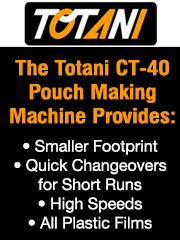Czech retail developments could affect converters.
- Published: November 01, 1996, By Sacharow, Stanley
If the Czech converting industry feels that Czech environmental legislation is being disregarded by retailers, the pressure on internal industry to conform to European Union legislation softens.
Two stories were reported in the English-language Prague Post when I visited both Prague and Bratislava (Slovakia) in early September. Both are of interest to label makers and others involved in flex-pack converting.
The Krone supermarket, probably the most upscale department store in Prague, occupies four floors at a prime location in famed Wenceslas Square (the veritable heart of downtown Prague). The store sells more than 250,000 returnable beer bottles each year, and, in strict defiance of the law, accepts none back, collecting the equivalent of $28,000 in deposits. Reclaiming the deposit on returnable beer bottles can be a rewarding business - especially for the average Czech, who cracks open the equivalent of 312 beer bottles each year.
Krone has only one store in Prague and does not report its financial earnings.
In the first seven months of 1996, inspection officials across the country received only 47 complaints about stores refusing to accept back returnable bottles. Six of those complaints involved Prague stores, and all cases were quickly resolved after shopkeepers admitted to ignorance of the law.
City-center rivals Tesco and Kotva both take back empties, and a straw poll conducted by the Prague Post found Krone to be the only offender among large Prague stores.
"(Krone) is stealing from the consumer," said Radek Svitil, spokesman for the Czech environmental association Recycling Group, which specializes in waste and packaging legislation.
Krone's management declined to comment on the store's policy, although one worker claimed that the supermarket doesn't accept empty returnable bottles because they are "free" - even though Krone charges the same as those shops that include the refundable 3Kc per bottle.
The refusal to accept returnables and the complete disregard for recycling legislation has significant implications to converters. Krone is completely Czech owned. If the Czech converting industry feels that Czech environmental legislation is being disregarded by retailers, the pressure on internal industry to conform to European Union (EU) legislation softens. It threatens the Czech Republic's eventual entry into the EU as well as the ability of its converting industry to market products to all of Europe.
Germany, a strong market, would not purchase Czech converted products unless the "Green Dot" is on the package. This can only be possible if all laws regarding returnables and recycling are met. How Krone's refusal to accept returnables will eventually affect Czech converters is anybody's guess.
In another story relating to the changing retail outlets in Prague, it appears that large department stores will soon be joined by hypermarkets and suburban shopping malls. Although this is a pan-European trend, it seems to be accelerating in the Czech Republic.
One of the major changes on the retail scene in the past year was the buyout of Kmart's operations by the British retail chain Tesco. Kmart's financial instability in the US led it to close its international branches. Although Tesco has conducted a strong marketing campaign since the takeover, no one from Tesco's local or British headquarters was available for comment.
The trend has seen the privatization of old state-owned companies, which later fragmented into smaller companies. Their successors seem to belong to three categories: strong local chains, international chains, and larger cooperatives.
The rise of Tesco in central Europe (the firm recently opened up in Budapest) may be a harbinger of the retail domination of the Czech packaging industry. In the U.K.-Tesco's home base - retailers "call the shots," and converters and packagers are guided by the needs of the retailers. When Tesco reported that shelf-stable retort pouches and trays could sell in the U.K. market, British converters soon supplied the packaging materials. The superb packages at Marks and Spencer (U.K.) were mostly designed by its firm with guidance to converters.
If Tesco begins to push British packaging philosophy to the Czechs, things will be dramatically different than at present. Czech converters now tell the retailers what they can do and when their products will be available. Guidance by a strong retailer may cause significant rumbles in the industrial sector. If the other foreign-owned stores - Delvita and Julius Meinl - follow suit, Czech converters will have to add personnel to their marketing, design, and sales staffs. Then the conversion from a socialist to a free-market economy will be almost complete!
Stanley Sacharow has been in the flexible packaging industry for almost 35 years. His company, The Packaging Group, is an organizer of targeted conferences and a consultant to the international packaging/converting industry. Contact him at 908/636-0885.













